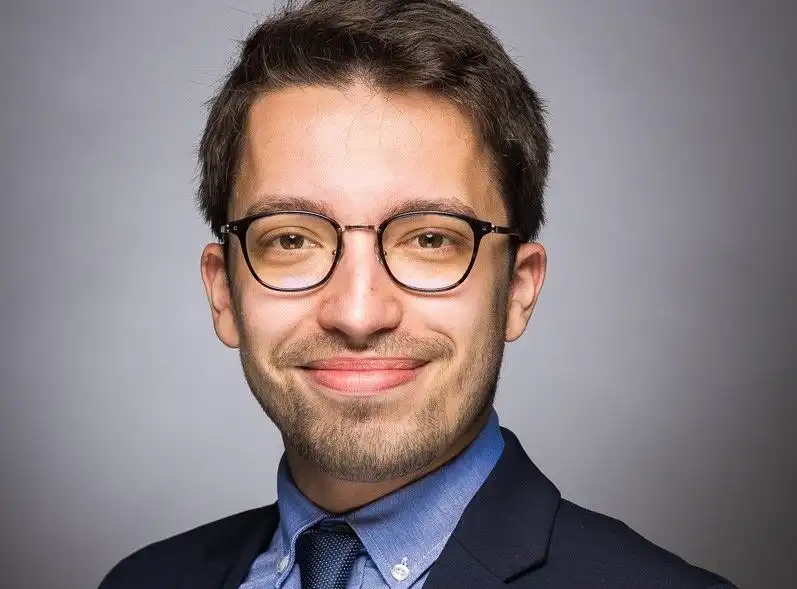Home>Quentin Huleux, Class of 2021
12.01.2024
Quentin Huleux, Class of 2021
Can you describe your academic and professional background?
I entered Sciences Po directly after a scientific baccalaureate, and did my undergraduate college on the Paris campus. After those first two years, it was time for my 3rd year abroad, which I spent at the University of California, on the lesser-known (but no less splendid) Santa Cruz campus. Back in Paris, I decided to enrol in the Master in Public Policy at the School of Public Affairs, in the Security and Defence stream. I spent my gap year learning about public administration, first with the General Directorate of the National Gendarmerie, then with the chief of staff of the Prefect of Indre-et-Loire during the Covid-19 crisis. Finally, in 2021, I began my career with the consulting firm Sopra Steria Next, as a transformation consultant for government ministries (Interior, Justice, Armed Forces). At the same time, for the last 2 years, I've been a teaching assistant for one of the lectures in the Security and Defence Master's programme: a way of giving back what I've been taught!
What were the major stages in the development of your career plan?
Although I think it's always difficult to trace a passion, my interest in the public sector is partly linked to my family background. I was imbued with a sense of commitment and a taste for the common good, and I very quickly wanted to understand how the State worked so that I could get involved myself. That's why, when I was still a teenager, I seized every opportunity I was given to discover, a little more each time, what goes on behind the scenes of the public administration machine. During these experiences, I was constantly reminded of two things: the strength of the public service lies in the dedication of its civil servants; its weakness lies in its inability to take the time and step back necessary to evolve. Several years later, during my gap year, and then when it came time to choose the path I wanted to follow (the famous Cornelian choice of public or private), this observation kept coming back to me. My final choice was to work as a consultant in the public sector, helping to improve government action.
What are the main aspects of your current position as a Defence and Security consultant at Sopra Steria?
Since September 2021, I have been working for Sopra Steria Next, on behalf of the Ministries of the Interior, Justice and the Armed Forces. My tasks there are those of a consultant providing support for general management and staff, particularly on subjects involving support for digital transformation. My tasks are numerous and vary regularly (it's an imponderable part of being a consultant): conducting forward-looking studies and formalising strategic documents (master plans, etc.), taking part in working groups with stakeholders, producing documents modelling the needs for optimising police and military work processes, etc. I also produce forward-looking notes (White Paper type) on subjects of the future for internal security (vehicle of the future, AI/Big Data, relations with municipal police forces, etc.).
What do you see as your next challenges?
From a professional point of view, my next challenges will be those of my client - and they are crucial! In the digital age, it will be a question of integrating disruptive technologies (with artificial intelligence at the forefront) into the day-to-day tools used by public service employees. However, innovation is not the answer to everything, so we must not forget the role of the human element in these public transformations. In short, these are philosophical as well as practical issues, in which the consultant will have a key role to play.
From a personal point of view, I'm constantly looking to broaden my range of skills: developing my knowledge of digital issues and innovation, passing it on and supporting both new employees and students at Sciences Po. Without losing sight of my desire to serve the common good!
How did your training at the School of Public Affairs, and more specifically the Security and Defence stream, contribute to your current position?
The qualities of the teaching provided by the School of Public Affairs are well known: a multi-disciplinary body of courses, a teaching staff with a mix of academic backgrounds and industry players, and so on. One point I would like to stress, however, is the importance attached at Sciences Po to taking stock and debate. Your professional life will bring you into contact with people from a wide range of professional and academic backgrounds. And in this melting pot, I think that this critical spirit is a considerable advantage when it comes to uniting a team and carrying out the tasks that fall to us.
Would you have any advice for a student or future graduate?
"I believe that man's free and curious spirit is the most valuable thing in the world". This quote from the American writer John Steinbeck is one of the legacies I inherited from my 3A in California, and undoubtedly a life lesson to be remembered at all times. At the time, when I had to choose which Masters degree (and therefore which career path) I wanted to follow, I was worried that I was going to end up on a one-way street that wasn't going to be very exciting. However, curiosity can be nurtured and fed in any context, as long as you put in a bit of willpower (and a few nights/weekends, I agree).
So I can only encourage every student and future graduate to choose the curious path rather than the easy one. At the very least, you'll gain rare experience and qualities; at best, you'll make it part of your life's journey.
